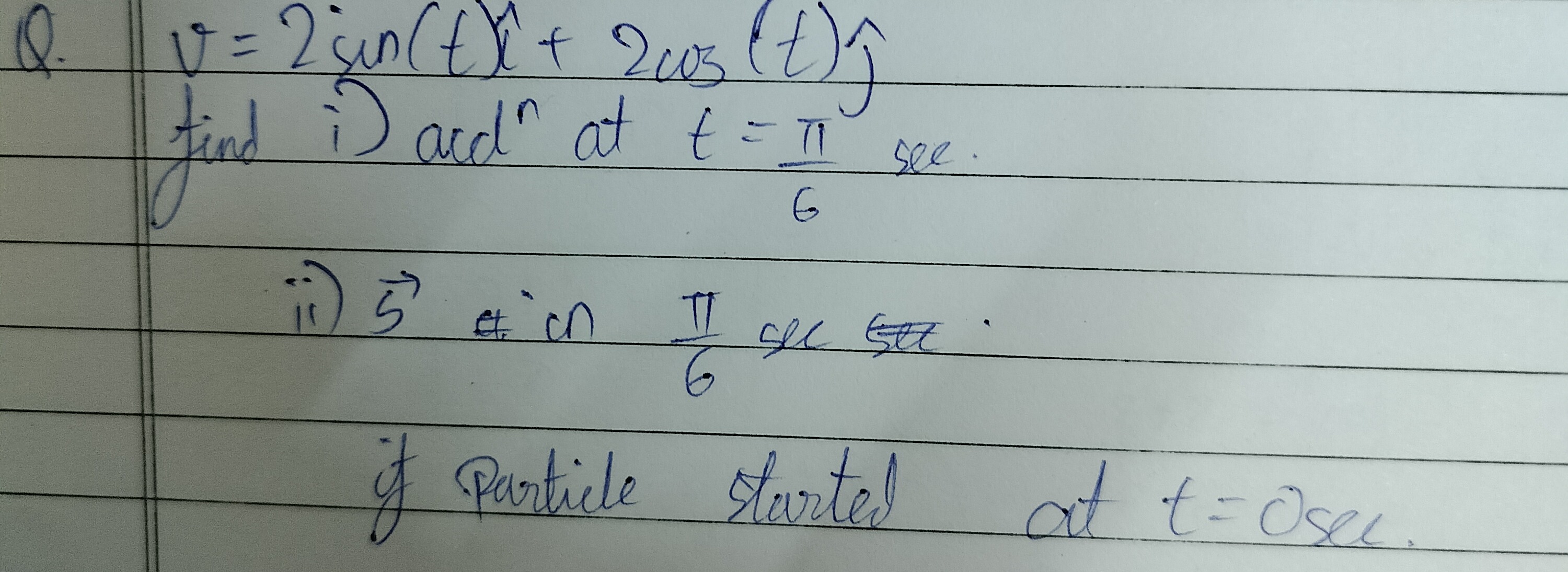Question
Question: Q. $v=2sin(t)\hat{i} + 2cos(t)\hat{j}$ find i) $acd^n$ at $t=\frac{\pi}{6}$ sec. ii) $\vec{s}$ at $\...
Q. v=2sin(t)i^+2cos(t)j^ find i) acdn at t=6π sec. ii) s at 6π sec. if Particle started at t=0 sec.

i) a(6π)=3i^−j^
ii) s(6π)=(2−3)i^+j^
Solution
Given the velocity of the particle as a function of time: v(t)=2sin(t)i^+2cos(t)j^
i) To find the acceleration a(t), we differentiate the velocity vector with respect to time: a(t)=dtdv=dtd(2sin(t)i^+2cos(t)j^) a(t)=2cos(t)i^−2sin(t)j^
Now, evaluate the acceleration at t=6π sec: a(6π)=2cos(6π)i^−2sin(6π)j^ Using cos(6π)=23 and sin(6π)=21: a(6π)=2(23)i^−2(21)j^=3i^−j^
ii) To find the displacement s(t), we integrate the velocity vector with respect to time: s(t)=∫v(t)dt=∫(2sin(t)i^+2cos(t)j^)dt s(t)=(−2cos(t)+C1)i^+(2sin(t)+C2)j^ where C1 and C2 are constants of integration. We can write this as s(t)=−2cos(t)i^+2sin(t)j^+C, where C=C1i^+C2j^.
The particle started at t=0 sec. Assuming the particle started from the origin, the displacement at t=0 is zero, i.e., s(0)=0. s(0)=(−2cos(0)+C1)i^+(2sin(0)+C2)j^=0 (−2(1)+C1)i^+(2(0)+C2)j^=0 (−2+C1)i^+C2j^=0i^+0j^ This implies −2+C1=0⟹C1=2 and C2=0.
So, the displacement vector is: s(t)=(−2cos(t)+2)i^+(2sin(t)+0)j^=(2−2cos(t))i^+2sin(t)j^
Now, evaluate the displacement at t=6π sec: s(6π)=(2−2cos(6π))i^+2sin(6π)j^ Using cos(6π)=23 and sin(6π)=21: s(6π)=(2−2(23))i^+2(21)j^ s(6π)=(2−3)i^+j^
Explanation:
i) Acceleration is the time derivative of velocity. Differentiate v(t) to get a(t). Substitute t=6π into a(t).
ii) Displacement is the time integral of velocity. Integrate v(t) to get s(t), including a constant of integration. Use the initial condition s(0)=0 (assuming starting from origin) to find the constant. Substitute t=6π into s(t).
